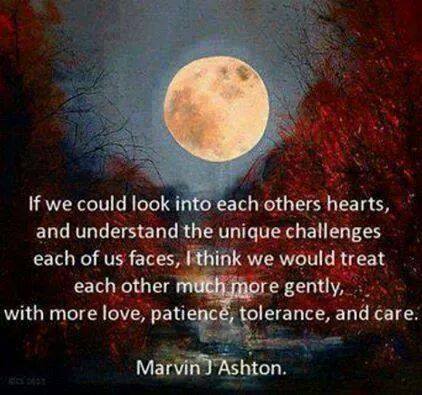“If we could look at each others hearts, and understand the unique challenges each of us faces, I think we would treat each other much more gently, with more love, patience, tolerance, and care.” Marvin J Ashton
Earlier this week, I was waiting for the light to change as I watched people cross in front of my car. It was a buffet of diversity – an old man hunched over, moving painfully slow, his face to the ground; a young woman scurrying quickly in her wobbly stilettos to make it to her bus stop; a weary mother pushing a baby carriage, while tightly clasping the hand of a reluctant toddler; and a sauntering teenager who gave me the “mean mug” glare, daring me to smile.
Each person presented so differently. Each one had a story. It made me wonder . . .
. . . how did these people come to be where they are today? How might they look different as they cross in front of me, if their history had been different? After all, who we are today is a result of the choices made yesterday, and the day before that, and the day before that.
I remember the first time I learned in Alice Miller’s book, The Drama of the Gifted Child, of Adolf Hitler’s history of severe child abuse at the hands of his alcoholic father. As a young graduate student, I was stunned to realize that I could actually feel compassion for this man who had once been a child, helplessly beaten and unprotected; while still recognizing the horror he created as an adult man, and holding him accountable for the suffering he created.
Compassion tends to make life less black and white. Not because it muddies the picture, but because it brings greater clarity. It connects our head and our heart, giving us greater resources, to have greater insight and understanding, and to make better decisions. It broadens the picture and sometimes makes the picture more complex; certainly more interesting.
So how would our lives be different if we more frequently accessed this resource of compassion?
Here’s a good place to start. As you look in the mirror this morning, you might want to consider paraphrasing Marvin Ashton’s words, and say first to yourself,
“As I look into my own heart, understand my own unique challenges that I face, I choose to treat myself much more gently, with more love, patience, tolerance, and care.”
Then, as you’re waiting for the light to change . . . I wonder how those crossing in front of your car might look differently to you.







The words “I choose to…” is the crux of the issue. Previous years have molded certain actions, etc., but recognition of change is always the way to go.
I absolutely agree, Ethel. And therein is our power to rise above the past to create something better in the future.